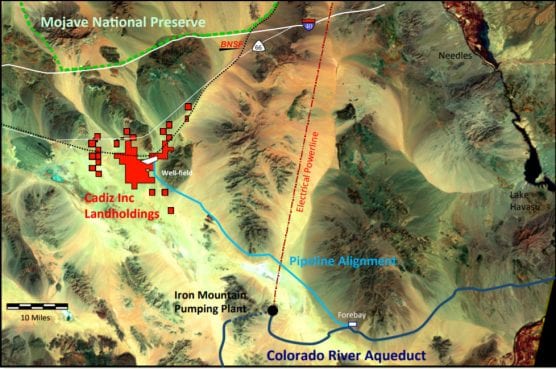SACRAMENTO – A business hoping to cash in on an untapped aquifer beneath the Mojave Desert will have to clear extra environmental reviews before it can build a pipeline and sell the water, under legislation signed late Wednesday by California Governor Gavin Newsom.
The proposal, Senate Bill 307, represents the latest snag in Cadiz Inc.’s decades-long quest to siphon billions of gallons of water from an ancient aquifer and pipe it to water suppliers.
The aquifer is below Cadiz’s 35,000-acre spread near the famous Route 66, and the company believes the project could supply water to hundreds of thousands of residents in the state’s drought-prone southern cities.
Conservationists have fought the project since it was first proposed in 1998, warning it would not only drain precious groundwater supplies but also ruin the desert habitat that sustains bighorn sheep, desert tortoise and Joshua trees. U.S. Senator Diane Feinstein, D-California, has also more recently opposed the project.
Newsom said in a signing message that more independent scientific analysis and public input is needed to determine whether the project and others like it can be done without environmental harm.
“This fragile ecosystem has existed, in balance, for centuries. Prior to allowing any project to move forward, there must be certainty that it will not threaten the important natural and cultural resources,” the Democrat said.
The Obama administration dealt the project a major blow in 2015, when it decided Cadiz couldn’t build an underground water pipeline to connect the groundwater to the Colorado River Aqueduct without federal approval. The Bureau of Land Management said the proposed 43-mile pipeline that would traverse stretches of federal land is beyond the scope of the General Railroad Right-of-Way Act of 1875 and found “no relationship between the express purpose for the pipeline and the railroad’s operation.”
But under the Trump administration, the federal agency reversed course in a 2017 superseding memo stating the 1875 act applies because the pipeline wouldn’t “‘interfere’ with the railroad, or because it will ‘further a railroad purpose.’” Environmental groups rallied against the reversal, and in June a federal judge struck down the Trump administration’s decision.
Between the judge’s decision and the new state law, it would seem that the controversial water project is on the rocks. Yet Cadiz CEO Scott Slater was confident Wednesday that the stringent environmental review required by SB 307 will only prove the project’s merits.
“California is home to over a million people who lack access to safe, clean, reliable drinking water,” Slater said in a statement. “We believe a fact-based evaluation of the project conducted under the governor’s watchful eye will undoubtedly conclude we can sustainably contribute to this effort.”
The law requires any project that would transfer groundwater from the Mojave National Preserve and Mojave Trails National Monument to not “adversely affect the natural or cultural resources.” State regulators would have a maximum of two years to review submitted project applications before making a decision. The measure cleared the Democratic-controlled Legislature in a series of mostly party-line votes and goes into effect on Jan. 1.
In a pair of tweets, the Natural Resources Defense Council called the bill’s signing “amazing!” and Sierra Club California said SB 307 will “protect the fragile Mojave Desert.”
Feinstein thanked Newsom for signing the bill and took a jab at Cadiz in a statement.
“For decades, Cadiz has tried to skirt federal permitting and rob the Mojave Desert of its most precious resource, water. Thanks to Governor Newsom’s signature, that effort has been thwarted and California now has significantly stronger protections for desert aquifers,” Feinstein said.
— By Nick Cahill
Like this:
Like Loading...
Related





 Tweet This
Tweet This Facebook
Facebook Digg This
Digg This Bookmark
Bookmark Stumble
Stumble RSS
RSS

























REAL NAMES ONLY: All posters must use their real individual or business name. This applies equally to Twitter account holders who use a nickname.
0 Comments
You can be the first one to leave a comment.